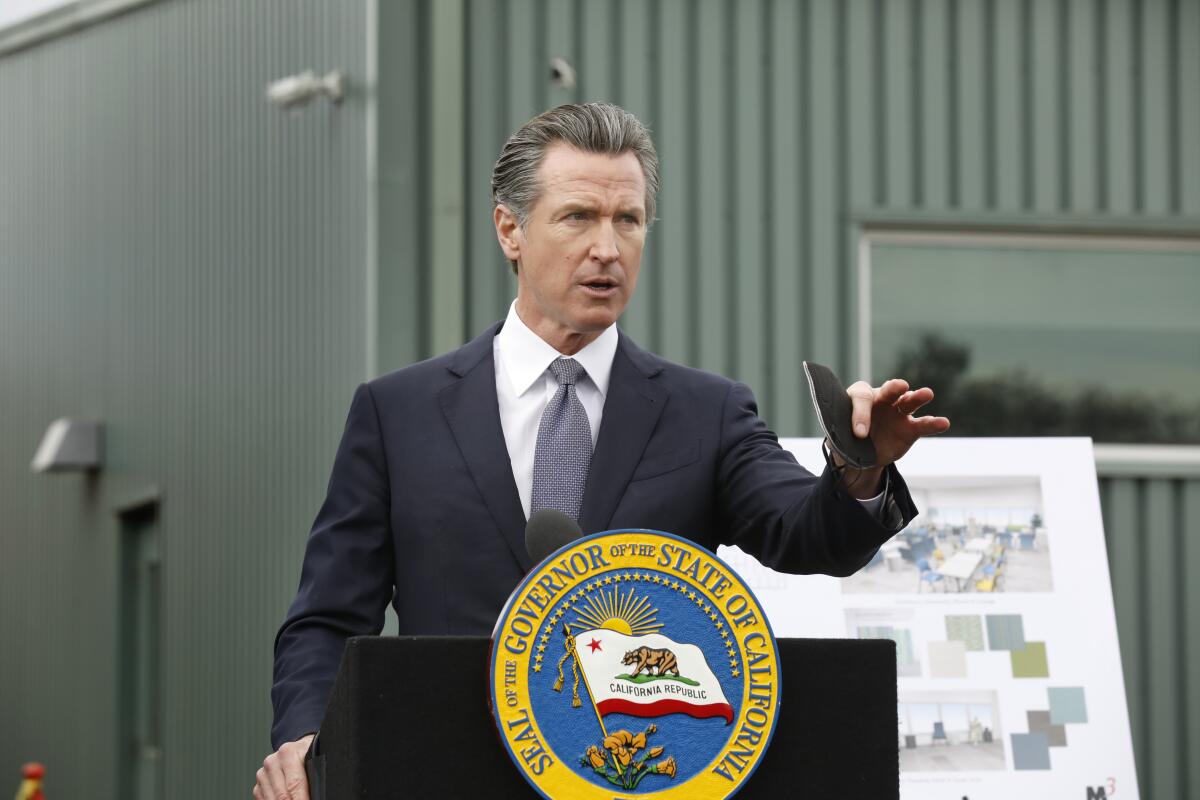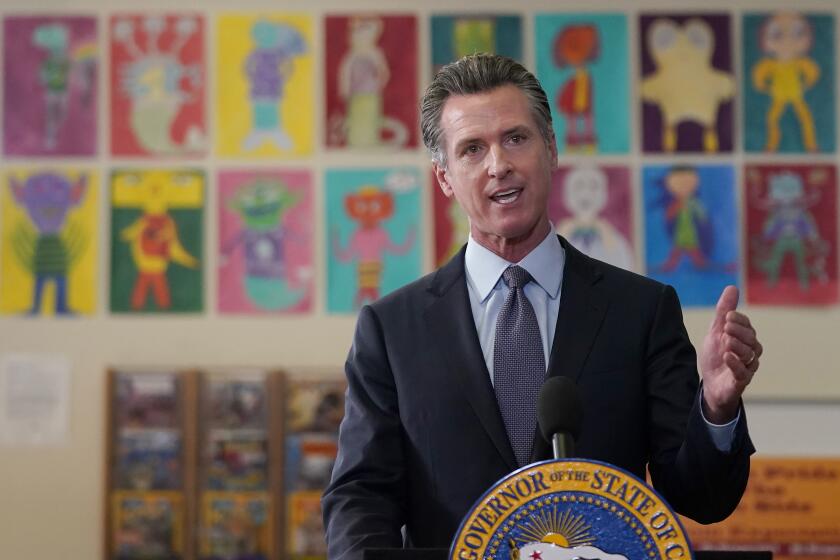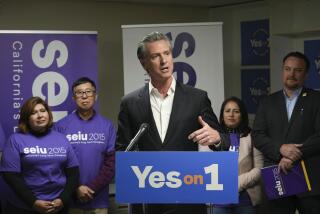Gov. Newsom’s approval hobbled by crime fears, homelessness crisis, poll finds

- Share via
SACRAMENTO — Less than five months after Californians overwhelmingly rejected a recall effort against Gov. Gavin Newsom, voters are growing more dissatisfied with the governor, and a solid majority believe the state is headed in the wrong direction, according to a new UC Berkeley Institute of Governmental Studies poll co-sponsored by the Los Angeles Times.
Concerns about rising crime and California’s seemingly intractable homelessness crisis emerged as the top political undercurrents driving voter dissatisfaction, with most of those surveyed giving Newsom poor marks on how he has handled those issues. Californians praised Newsom’s ability to guide the state through the COVID-19 pandemic, but two-thirds believe the crisis is subsiding, diluting its effect on his overall job approval ratings, said Mark DiCamillo, director of the poll.
“You see a lot of changing going on in the public’s mind. I think they’re focusing less on COVID, more on the other long-standing issues that the state has been facing,” DiCamillo said. “The state has some major issues, and he’s the governor. The buck stops there.”
Newsom’s prospects for reelection in 2022 still appear strong, however, with less than four months to go before the June primary.
Thus far, Newsom’s top challenger is Republican state Sen. Brian Dahle, a seasoned Northern California conservative lacking a statewide political profile. During his nine years in the Legislature, Dahle has never had to raise the tens of millions of dollars necessary to run for governor in a state as vast as California. Newsom already has raked in $25 million for his reelection effort. When announcing his candidacy, Dahle likened the task to “David versus Goliath.”
After the failed Sept. 14 recall election, Former San Diego Mayor Kevin Faulconer said he would consider running for governor in 2022 and on Monday said he will be announcing his decision soon. The moderate Republican received little support when he ran as a replacement candidate in the recall.
According to the poll, 48% of registered voters surveyed approved of Newsom’s job as governor, while 47% disapproved — a difference within the survey’s margin of error. That’s down from the 64% approval rating California voters gave Newsom in September 2020 amid the first wave of the pandemic.
Fifty-nine percent of voters said they would support changing the law to potentially allow for more felony prosecutions.
More than half of registered voters polled, 54%, believe California is on the wrong track compared to 36% who believe the state is on the right path, with the remainder expressing no opinion. Voters were evenly split just last May.
While disapproval of Newsom has always been strong among conservatives, the poll found criticism rising slightly — seven percentage points — among Democrats compared to six months ago, although Democrats still overwhelmingly give Newsom high marks. Among Californians registered as “no party preference” or with other political parties, 41% approved of Newsom’s job as governor and 51% disapproved.
Majorities of Latino, Black and Asian American/Pacific Islander registered voters approved of Newsom’s job as governor, while a majority of white voters disapproved. Since September, voter dissatisfaction has risen slightly among white, Latino and Asian American/Pacific Islander voters. Newsom gained support among Black voters during that time.
A spokesman for Newsom’s reelection campaign said the governor has “decisively guided California through historic and unprecedented crises” of the pandemic while taking action to address California’s most entrenched and challenging problems.
“His actions saved lives and provided real help to families as they faced uncertainty,” said spokesman Nathan Click. “He remains 100% focused on providing solutions to California’s most vexing challenges — from the pandemic and climate change to homelessness and public safety.”
Though the Berkeley poll found strong voter support for Newsom’s actions addressing the pandemic and climate change, the biggest danger sign for Newsom is growing voter anger over crime and homelessness, DiCamillo said.
Newsom is all but alone on the public stage with just six months to go before the June statewide primary, a testament to his defeat of the recall.
Two out of three registered voters said Newsom is doing a poor or very poor job addressing homelessness, an increase of 12 percentage points from 2020, according to the survey. On crime and public safety, 51% of voters surveyed said the governor was doing a poor job, up 16 percentage points from 2020.
“There’s a long history of state residents being concerned about crime. It hasn’t been that prominent in recent years, but now appears to be coming back,” DiCamillo said. “That issue has become much more prominent, and Newsom is much more vulnerable.”
Rising crime promises to be a major issue for Republicans in the 2022 election, especially in the races for governor and California attorney general. Conservatives blame California’s ongoing struggles with crime on policies embraced by Newsom and the Democratic leadership at the state Capitol for decades.
That includes Democratic support for Proposition 47, the 2014 voter-approved ballot measure that reclassified some felony drug and theft offenses as misdemeanors, and Proposition 57, a parole overhaul measure ratified in 2016. Earlier this year, the Newsom administration expanded good-behavior credits permitted under Proposition 57, allowing an additional 76,000 prisoners to qualify for early release.
The Berkeley poll found that most voters want to see changes to Proposition 47.
“Our state is drastically out of balance now. Families need to feel safe when they’re walking their kids to school or walking to the car after work,” Faulconer said Monday. “Homelessness is exploding. Crime is on the rise. I hear every single day how innocent Californians are being attacked or being the victims of theft.”
Dahle seized on the issue on his first day running for governor.
“We have a devastating crime wave. Murders are up by a third in California,” Dahle told supporters last week. “Retailers are turning into bunkers or closing down altogether because of rampant theft, while the majority party does everything it can to reduce the penalties for lawbreakers.”
Newsom has long advocated for reducing recidivism through educational opportunities and mental health programs instead of enacting new tough-on-crime laws that have historically swelled California’s prison population, including a 1994 law that significantly lengthened prison sentences for repeat offenders with a serious or violent felony record. Newsom also has defended Proposition 47, saying property crimes have been on the decline in California since it took effect.
“Ten years ago, crime was not a top issue, and people felt pretty good about their safety,” said Dave Gilliard, one of the Republican consultants who led the effort to recall the governor. “I don’t think that’s the case this year. I think this year it’s going to be a much hotter issue.”
Gilliard said the effort to recall Newsom was gaining momentum in the early summer when the campaign focused on the governor’s record on issues such as crime and the cost of living, including the unaffordable housing market and rising gasoline prices.
That changed in large part because of the failed strategy of the campaign’s Republican front-runner, conservative talk show host Larry Elder, Gilliard said.
Elder’s support for Trump and offshore oil drilling, along with his opposition to abortion rights and COVID-19 vaccination and mask mandates, alarmed Democrats and drove voter turnout. Sixty-two percent of California voters rejected recalling Newsom, while 38% voted in favor.
The Berkeley poll was conducted online in English and Spanish from February 3 to 10 among 8,937 California registered voters.
More to Read
Sign up for Essential California
The most important California stories and recommendations in your inbox every morning.
You may occasionally receive promotional content from the Los Angeles Times.













